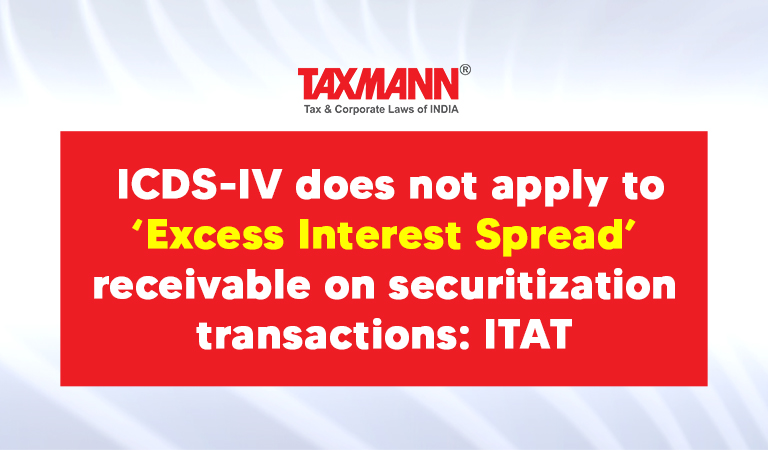ICDS-IV does not apply to ‘Excess Interest Spread’ receivable on securitization transactions: ITAT
- Blog|News|Income Tax|
- 2 Min Read
- By Taxmann
- |
- Last Updated on 3 October, 2022

Case Details: Poonawalla Fincorp Ltd. v. PCIT - [2022] 142 taxmann.com 530 (Kolkata-Trib.)
Judiciary and Counsel Details
-
- Sanjay Garg, Judicial Member & Girish Agrawal, Accountant Member
- S.K. Tulsiyan, Adv. & Ms Puja Somani, CA for the Appellant.
- Amitava Bhattacharya, CIT DR for the Respondent.
Facts of the Case
Assessee was an Asset Finance Company (AFC) registered as a Non-Banking Finance Company (NBFC) with the Reserve Bank of India. During the year, it entered into a securitization transaction. The assessee sold its loan portfolio to a Special Purpose Vehicle (SPV) for immediate cash payment.
SPV sold security interests to third-party investors. The assessee filed its return of income showing Excess Interest Spread (EIS) on securitization transactions in the subsequent years in which such income was received.
Later, the Pr. CIT exercised the powers under section 263 and contended that such receipt was in the nature of interest that should be disclosed on an accrual basis as per ICDS-IV. Aggrieved-assessee filed the instant appeal before the Kolkata Tribunal.
ITAT Held
The Kolkata Tribunal held that the Reserve Bank of India (RBI) vide circular dated, 21-09-2012, has clarified that recognition of EIS shall be done only when the same is redeemed in cash.
Assessee being an NBFC is governed by the RBI instructions which are binding on it and override the provisions of the Income-tax Act. Accordingly, it had offered its income to taxation as per the regulations formulated under the special Act.
Further, ICDS-IV does not apply to EIS receivable on securitization transactions as it is not “interest” under section 2(28). As per the definition in section 2(28), “Interest” is in respect of any money borrowed or debt incurred.
However, in the present case, the loan portfolio was sold by the assessee to the SPV and therefore is no longer a lender for the customers. The loan ceases to exist in the audited accounts of the assessee on the date when the securitization agreement was entered into by the assessee. Accordingly, once EIS was held as not in the nature of “interest” as defined under section 2(28), ICDS-IV has no application.
Disclaimer: The content/information published on the website is only for general information of the user and shall not be construed as legal advice. While the Taxmann has exercised reasonable efforts to ensure the veracity of information/content published, Taxmann shall be under no liability in any manner whatsoever for incorrect information, if any.

Taxmann Publications has a dedicated in-house Research & Editorial Team. This team consists of a team of Chartered Accountants, Company Secretaries, and Lawyers. This team works under the guidance and supervision of editor-in-chief Mr Rakesh Bhargava.
The Research and Editorial Team is responsible for developing reliable and accurate content for the readers. The team follows the six-sigma approach to achieve the benchmark of zero error in its publications and research platforms. The team ensures that the following publication guidelines are thoroughly followed while developing the content:
- The statutory material is obtained only from the authorized and reliable sources
- All the latest developments in the judicial and legislative fields are covered
- Prepare the analytical write-ups on current, controversial, and important issues to help the readers to understand the concept and its implications
- Every content published by Taxmann is complete, accurate and lucid
- All evidence-based statements are supported with proper reference to Section, Circular No., Notification No. or citations
- The golden rules of grammar, style and consistency are thoroughly followed
- Font and size that’s easy to read and remain consistent across all imprint and digital publications are applied



 CA | CS | CMA
CA | CS | CMA
